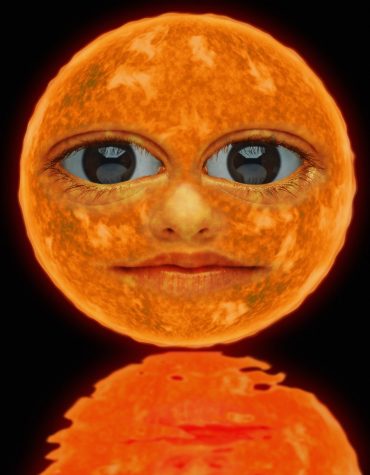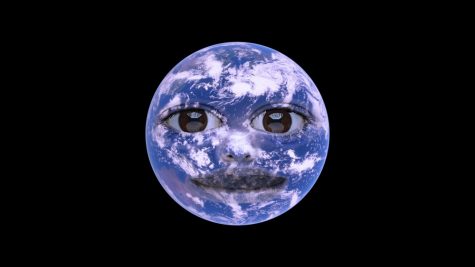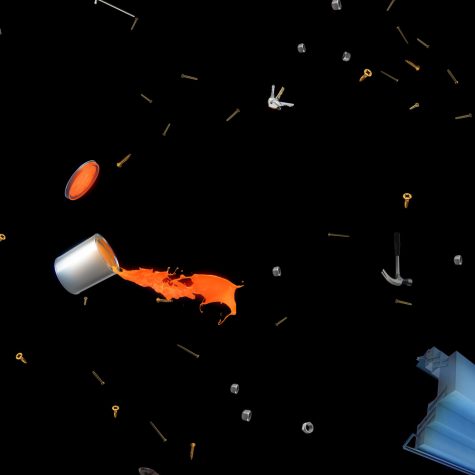Call to curb climate change
Frye’s new art exhibit discusses viewer’s role in changing Earth’s future
March 5, 2020

Agnieszka Polska. The New Sun, 2017. Ink print on archival paper.
The room is dark, but not quiet, as the wide-eyed face of the sun stares straight at the viewer sitting on the lone bench before it. The sun speaks in a man’s voice, reeling through a variety of emotions as a timer ticks down behind the unsuspecting viewer.
Entering “Love Bite,” an exhibit currently open at the Frye Art Museum, two videos play on wall-sized screens across from each other.
Mysterious and foreboding, they loop infinitely, one beginning as the other ends and displays a silent timer. The exhibit continues into another room with a third video, larger and louder than the ones before it.
Polish artist Agnieszka Polska uses this piece to address the unfathomability of the impending consequences of global warming and environmental collapse. Using audiovisual essays, she encourages viewers to act upon these issues.
“Polska seeks to inspire behavioral transformation on a societal scale by leveraging the ethically persuasive power of affect,” Chief Curator Amanda Donnan wrote in the exhibit description.
Donnan explained that ‘affects’ are untranslated versions of emotion that, as Polska suggests, can create new bodily experiences and encounters.
These experiences and affects are not limited to the single video.
The piece involves two exhibits, and a total of three videos. The first two, titled “The New Sun” and “What the Sun Has Seen,” featuring two characters: the “Little Sun,” and the Earth. Both focus on the way the Little Sun, with large and steady eyes, is a helpless observer of the actions taking place on Earth.
The character Little Sun is inspired by Polish writer Maria Konopnicka’s poem “Co słonko widziało,” (what the sun has seen). Polska explains that the poem describes the daily routines of rural life from the sun’s point of view.
By using this sun character as an observer to describe the effects of climate change on Earth, Polska reflects on the way many individuals are simply observers to environmental issues. She makes it so the videos are delivered in a variety of tones that create emotional atmospheres and exercise the viewer’s sense of empathy, like contemplation, humiliation, terror and affection.
“Trained on the viewer, the gaze of these oversized eyes grabs us at the deep psychological level associated with bonding and established in infancy in relationship to our parents’ faces,” Donnan wrote.
Donnan also described how Polska continued aiming for the attention and empathy of the common viewer by formatting the videos similarly to those on Youtube, especially videos made by vloggers.

Agnieszka Polska. What the Sun Has Seen (still), 2017.
The Little Sun, Donnan said, delivers its monologue in a way that seems like an absurd amplification of the public, and yet personal, method of addressing the viewer commonly used in vlogs.
Polska does not limit her inspirations to modern video formatting. In the third video, “The Happiest Thought,” she references Einstein’s theory on general relativity published in 1915.
This theory came to mind when the scientist deliberated on how, should a construction worker fall from a roof, they and their tools would hit the ground at the same time. To the worker, their tools would appear to float above them as they plummeted down.
Polska incorporated this theory by beginning the video with the viewer in the same position as the falling worker, sitting under a tilted screen that showed floating coins, screws, and a bucket of paint against a space backdrop.
“An omnipresent voice guides the viewer through a detailed visualization of Einstein’s scenario, directing their awareness to the weight of their own body within a space on a planet accelerating through the cosmos,” Donnan wrote.

Agnieszka Polska. The Happiest Thought (still), 2019. HD video, adaptation from a fulldome video
(color, sound); 21:02 min.
By creating an awareness of the world around them, Polska directly addresses the viewer and their place in the world. She finds that this may help viewers find their role in the possibility of the environment’s collapse.
“It prepares people for some field of possible future actions, in producing a mood or structure of feeling that makes possible certain kinds of actions, thought, [or] speech … that might not have seemed possible before,” Polska said.
“Love Bite” opened Feb. 15 and will continue until April 19, 2020.
























































































